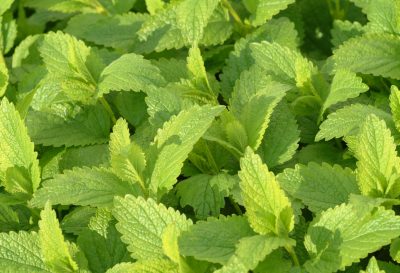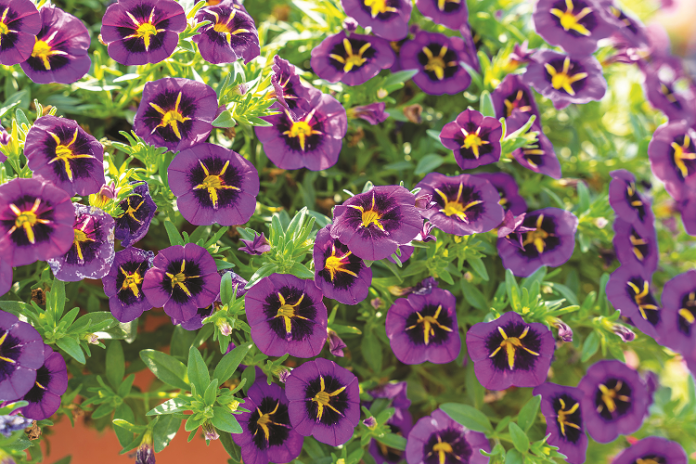We’re making sure our gardens look lovely and lively while prepping for seasonal change.
We’re planting … Calibrachoa
‘Midnight Kiss’ for its vivid trumpet-shaped blooms that live up to its name: Glowing deep purple diffusing into a dark centre overlaid by a bright yellow star. This neat, round plant grows 25 to 30cm high and wide and looks gorgeous in hanging baskets and containers as well as a garden groundcover. Plants are self-cleaning so they stay neat and tidy. Plenty of morning sun and some afternoon shade is recommended. Plant in fertile well-composted soil that drains well, yet remains moist. Feed once a month. The flowers attract nectar-seeking birds, bees and butterflies. Details: ballstraathof.co.za
Herb of the month
Lemon Balm (Melissa officinalis) is a calming herb that’s also a delicious dessert herb, used for flavouring ice-creams and sorbet or added to fruit dishes and drinks. It has a gentle lemon-mint fragrance and flavour that makes a delicious tea, for sipping after dinner as a digestive or for winding down after a busy day.
Lemon balm can be sown in summer through to autumn and grows in sun or partial shade. The compact plants (30 to 40cm high) are also suitable for window boxes and pots. It grows in ordinary garden soil, enriched with spadefuls of compost or in good quality potting soil. Feed pots monthly with a liquid fertiliser like Margaret Roberts Organic Supercharger. Space plans 30cm apart and pick the leaves in the afternoon when its essential oils are the strongest. Regular picking will produce a bushier, leafier plant. It flowers in summer, producing small white blossoms with sweet nectar that attracts the bees, hence its scientific name. Melissa is Greek for honeybee. Water it well during hot, dry weather.
Details: kirchhoffs.co.za

Did you know that Melissa officinalis is a dog-friendly herb? A mild infusion in their drinking water helps dogs with digestive problems and helps to calm those with separation anxiety. It even reduces flatulence. Note: If used for medicinal purposes check with a reputable source for recipes and dosage.
Garden tasks for March
• Start sowing autumn and winter veggies.
• This is the ideal month to sow sweet peas in well-prepared trenches 50cm deep. Those sown now will flower in June.
• Other winter flowers that grow easily from seed are alyssum, African daisies (aka Namaqualand daisies), Bokbaaivygies (mesembryanthemums), Linaria, poppies, snapdragons, Virginian stocks, and indigenous winter colour mixes.
• Fertilise shrubs with 5:1:5 or 8:1:5 to strengthen them for winter. Water camellias and azaleas regularly to encourage the development of spring buds.
• Keep your lawn green during winter by fertilising now with Ludwig’s Vigorosa and water regularly.
Indoor plant of the month
Philodendron ‘Prince of Orange’ is a beautiful multi-coloured hybrid from South America. The new leaves emerge as golden orange, mature to copper and finally turn green, with the three colours always present on the plant. It is relatively slow growing and compact (up to 60cm high) which makes it perfect for smaller spaces. To make the most of its colours, position it to receive plenty of bright, indirect light. It can also take some filtered morning sun. Like all philodendron, ‘Prince of Orange’ likes moist but not wet soil. Water only after the top 3cm of soil has dried. Feed once a month with a liquid fertiliser to encourage large leaves. Rotate every now for a balanced plant. Details: lvgplant.co.za
TEXT: Alice Coetzee






